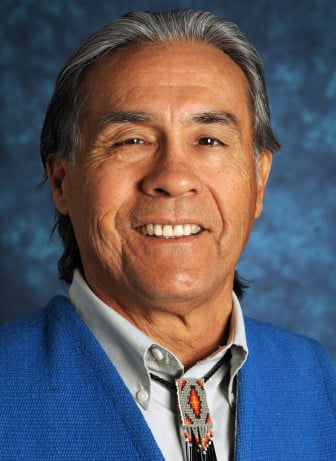
Courtesy photo
Donald Pepion, an NMSU anthropology professor and facilitator for the university’s American Indian Studies minor, had his own challenges to overcome early on. “Yeah, I got in trouble with the law. Yeah, I used to drink and fight. But that’s part of the journey,” he said.Donald Pepion was a cowboy on a ranch on the Blackfeet Reservation in Montana. As a youth, he rode horses bareback because his family didn’t have money to buy a saddle.
At 14, he was the youngest cowboy riding bareback in the rodeo.
As he was planning to drop out of high school his junior year, Pepion injured his hip, forcing him to hang up his spurs and focus on his education. To that point, he hadn’t earned good grades in school, he said.
That was the first of a couple of key moments in Pepion’s life when he chose education, propelling him to a different life. Today, Pepion, 69, is an anthropology professor at New Mexico State University and facilitates the university’s American Indian Studies minor.
He grew up as many Native Americans do. Natives have the highest poverty rate in the United States and face other challenges — high rates of alcoholism and crime on reservations among them. Historical trauma caused by genocide, forced assimilation and related issues are significant even today, Pepion said.
For Pepion, overcoming involved working his way from near-homelessness to earning several academic degrees.
He graduated from high school in 1964 and enrolled in a two-year accounting program. It was part of the Bureau of Indian Affairs’ effort to relocate Native Americans from reservations to urban areas, a last attempt by the government at assimilation.
Once he was a trained accountant, Pepion worked for the BIA in Albuquerque. His life became a “typical urban Indian” story from there, he said. He spent time in the bad parts of town, where there was lots of drinking and fighting. He got into trouble with the law. He was laid off from his job and was close to living on the streets.
“There were times where I was hungry and I couldn’t find a job, so it was pretty tough,” Pepion said.
What happened next helped propel Pepion toward success: He enrolled in a college program for troubled men. He completed two years of college in Santa Fe and was hired as a teacher’s assistant. He went on to attend NMSU to complete his bachelor’s degree. He later earned master’s and doctorate degrees from Montana State University.
“There was a point in my life where I could have either gone to prison or gone to college, and I chose college, and I’m grateful for that,” he said. “Yeah, I got in trouble with the law. Yeah, I used to drink and fight. But that’s part of the journey.”
Along the way, he became the first member of the Blackfeet tribe to serve as president of Blackfeet Community College. He also worked as a health administrator and helped create training programs for his tribe.
His elders held a ceremony for him and gave him a war bonnet — a prestigious symbol of honor for his service with the college.
Pepion has lived in Las Cruces for the past 13 years, and has been a professor at the university for seven. He works to raise consciousness of Native American history, issues, topics and policies. It’s important for people, especially Native Americans, to know where Natives come from so they have a better understanding of who they are, he said. With that knowledge, it’s easier to move forward.
“Helping Native students and people to raise their own consciousness through a learning process … it’s important,” he said.